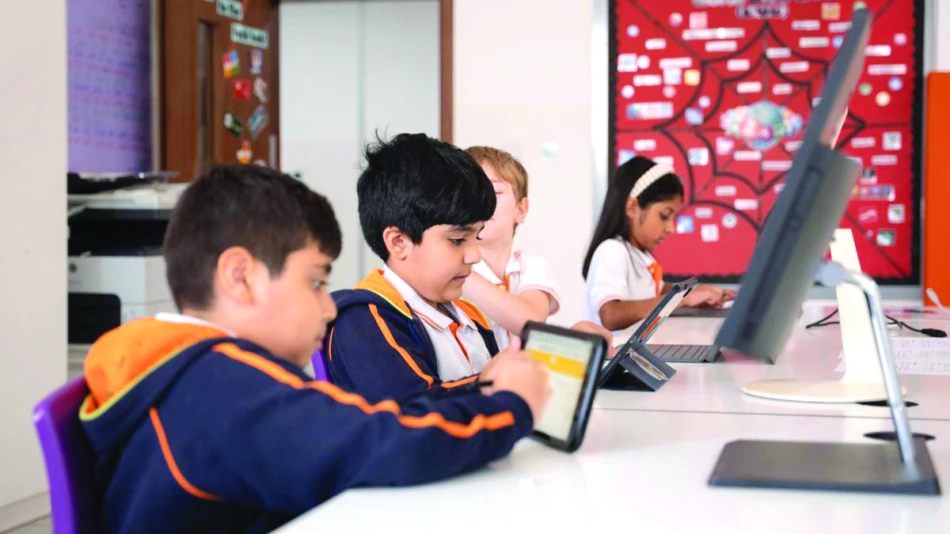
Dubai Schools and Early Childhood Centers Mandated to Implement Arabic Language Education Policy
Dubai Mandates Arabic Language Learning for All Private Schools and Early Childhood Centers
Dubai's Knowledge and Human Development Authority (KHDA) has introduced comprehensive requirements for private schools and early childhood centers to implement Arabic language education policies, targeting over 400,000 students across the emirate. The initiative represents a significant shift toward preserving cultural identity while maintaining Dubai's position as a multilingual educational hub, with implementation set to begin in September 2025.
Comprehensive Coverage Across Dubai's Educational Landscape
The policy affects a substantial educational ecosystem: 387,441 students enrolled in Dubai's private schools, supported by 27,284 teachers, alongside 274 early childhood centers serving 27,490 children. This scale demonstrates Dubai's commitment to systematic Arabic language integration across its diverse international education sector.
The mandate requires institutions to develop effective educational programs based on play-based learning, exploration, and sensory experiences designed to foster love for the Arabic language among children. Schools must dedicate at least one-third of weekly instructional time to Arabic language activities through engaging, child-friendly approaches.
Phased Implementation Strategy
Initial Phase Targeting Critical Age Groups
The first phase, launching in September 2025 (April 2026 for schools following the April-March academic calendar), focuses on children aged 4-6 years—the pre-primary education stage. This timing aligns with research showing early childhood as the optimal period for language acquisition and cultural foundation building.
After two years of implementation, authorities will evaluate outcomes to determine mechanisms for subsequent phases, suggesting a data-driven approach to policy expansion rather than blanket implementation across all age groups simultaneously.
Balancing Cultural Preservation with Educational Diversity
Inclusive Approach for Native and Non-Native Speakers
The policy applies to all children registered in Dubai's private schools and early childhood centers, regardless of their Arabic language background. This inclusive framework aims to establish Arabic as both a fundamental and cultural language while supporting linguistic diversity within the educational community.
The KHDA acknowledges the complexity of implementation across varied linguistic models, curricula, and student demographics. Rather than imposing uniform mechanisms, the authority plans to align educational guidelines with each curriculum's nature while maintaining clear, specific expectations for all institutions.
Modern Pedagogical Foundation
The policy incorporates contemporary educational principles for childhood language learning, emphasizing that children learn effectively through open conversations, questioning, storytelling, imaginative play, sensory experiences, and visual materials. This approach contrasts with traditional rote learning methods, potentially making Arabic more accessible and enjoyable for international students.
The framework recognizes that interaction between children, parents, and peers supports linguistic and social development, while repeated exposure to proper Arabic enhances natural grammar acquisition—principles that could benefit Dubai's multicultural student population.
Strategic Alignment with Dubai's Educational Vision
This initiative harmonizes with Dubai Education Strategy 2033 and related educational policies, positioning Arabic language education within broader goals of cultural preservation and global citizenship development. The policy specifically aims to enhance educational quality supporting multilingualism and cultural growth while enabling non-Arabic speakers to acquire the language as global citizens.
Teacher Quality and Flexibility
Institutions must maintain current teacher employment requirements while prioritizing educators fluent in classical Arabic. The KHDA grants schools flexibility in choosing appropriate teaching methods that achieve policy objectives while preserving each institution's unique character and student demographic needs.
Implications for Dubai's Educational Competitiveness
This policy reflects Dubai's balancing act between cultural identity preservation and maintaining its appeal as an international education destination. By implementing Arabic language requirements thoughtfully—with flexibility for different curricula and student backgrounds—Dubai appears to be following Singapore's model of maintaining cultural languages alongside English-medium international education.
The success of this initiative could influence similar policies across the Gulf region, where governments increasingly seek to preserve Arabic language competency among younger generations growing up in multilingual environments. For international schools and parents, this represents both an opportunity for cultural integration and a potential challenge in curriculum planning and resource allocation.
Most Viewed News

 Sara Khaled
Sara Khaled






